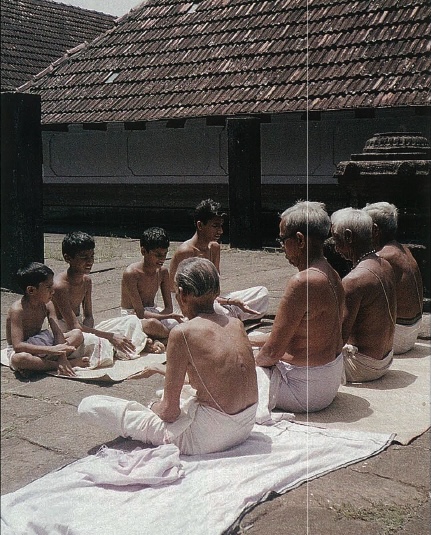By Vrindavanam S. Gopalakrishnan
The ancient Jaiminiya Sama Vedic tradition, a Sanskrit chanting system practiced in the South Indian state of Kerala long ago, is on the verge of extinction. There are only a few scholars alive today who are qualified to teach the recitation of the Vedas in this obscure method, and they reside only in certain parts of Kerala and at Thiruvaiyuru in Tamil Nadu’s Tanjavur district. Of these experts there are said to be only five who can chant in this system perfectly without error, and they are all in their late seventies. These five masters are the teachers at a new Veda Vidya Peetham, a school established by the Vishwa Hindu Parishad to pass on Vedic knowledge to children in the Panjal village of Kerala’s Thrissur district.
There are three recensions or regional versions of the Sama Veda. The Kautuma is associated with Gujarat, the Rayaneeya, which is quite similar, with northern Karnataka State, and the Jaiminiya, associated with the Nambudiri brahmins of Kerala. According to Brahmashree Neelakantan Namboothiri, one of the five scholars teaching at the school, the Jaiminiya recension is the oldest. The Sama Veda differs from other Vedas in that it is chanted with some melody. Visithttp://sanskrit.bhaarat.com/ Dale/SamaVeda.htmlfor an audio example.
It is widely believed that the colonization of India and the later advent of communism in Kerala discouraged brahmin families from practicing these Jaiminiya Vedic rituals. Through these negative influences, such ritual practices were dismissed as superstitious. Additionally, the Land Reforms Act, enforced in Kerala following the ascension to power of the communist party, deprived the brahmin families of land much needed for the already expensive organizing, funding and performance of such Vedic rituals. As a result, even rich patrons able to afford almost any cost of a ceremony could not get a place to do it.
Through the years, the rise in the cost of living coupled with the growing influence of Western culture made it impossible for priests to support themselves by these ceremonies alone. Also, the necessary austerity and discipline of this teaching made it unattractive to the youth. Yet, even with all of this, there are now young boys showing some interest in learning the ancient Jaiminiya Sama Veda way.
Classes at the new school are taught in the oral tradition, as they have been from ancient times. According to the school secretary, their aim is to creat the “atmosphere of the age-old gurukul tradition,” and no corporal punishment is used. On the school grounds are a main building, library and residential accommodations for students. At present, less than ten children attend.
Commenting on the new peetham, his Holiness, Sankaracharya of Kanchi Kamakodipeetham, Jagat Guru Jayendra Saraswathi said, “I am proud of Kerala for two things: One, it is the land of Adi Sankara. The other is that it is the home of the rare Jaiminiya Sama Veda tradition, still preserved today for our country.”
